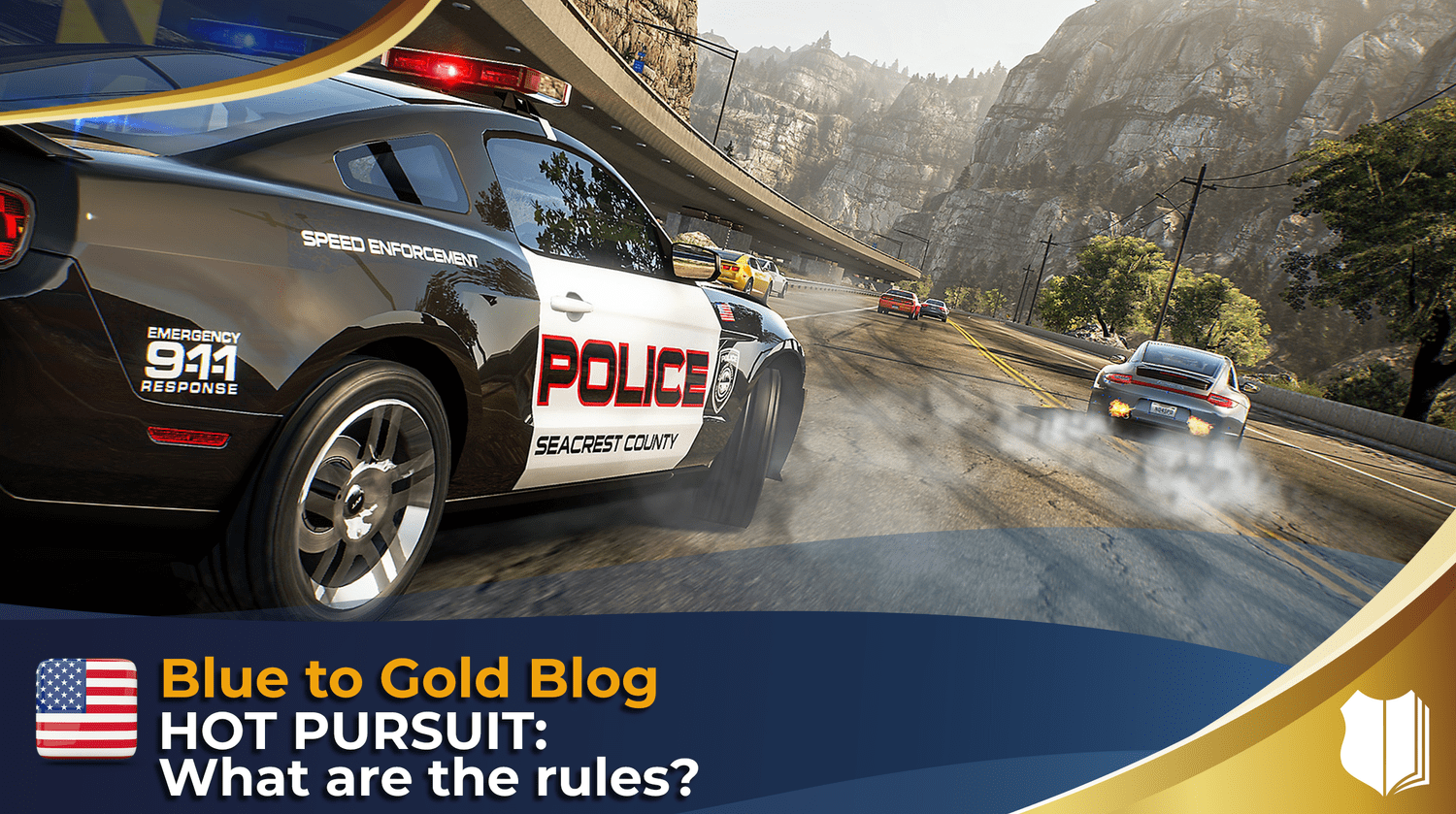“What are the Hot Pursuit requirements?”
Let me fill you in on what’s going on with this case so that you have some context.
An officer observes a male about to exit a house, but upon seeing the officer, he steps back in. This is pretty common suspicious behavior, not necessarily reasonable suspicion, but suspicious. Now the officer knows that this location has a history of drugs. It’s a known drug house.
So, he goes down the street, he parks and then he sees that same male exit the house, cross the street at an angle against city ordinance, (you have to cross at 90 degrees), thus committing an infraction in the officer’s presence. The male then enters the property of another person who the cop knows has complained about people crossing their lawn.
Now, we have probable cause for the crossing of the street violation. And then we have reasonable suspicion that they’re trespassing, even though we don’t have a victim at this point. But we at least have reasonable suspicion that the owner of the house would not want this and they would want to file a complaint.
The officer drives down the road, and he’s going to try to make contact with this guy. And the male, upon seeing the marked patrol vehicle, (we’re not chasing him, there are no lights on), he takes off running, unprovoked flight, into an address where a woman was standing at the open door. He runs into the house and slams the door.
The officer gets out, quickly approaches the door, knocks and announces, “Hey, police,” and the lady answers the door. The cop says “Where’d he go?” And she replies, “Who?” Can you picture this?
The officer pushes the door open and goes in past her. No resistance by her; she doesn’t resist but opens the door. He pushes past and goes into the house and observes the male exiting out the back window. The cop does not follow because he’s too big for that window. So he goes around to the front and then out into the back yard to pursue him. Now he doesn’t see the male anymore.
When he gets back around to the front of the house, he hears the woman talking to a male inside. He believes that that male is the one that he was chasing. So he re-enters the house. He then does a protective sweep and locates a different male hiding in a closet. Now that person wasn’t the guy he was chasing, but that person has a warrant. And he’s arrested on that.
This has a lot of moving parts here. So, we’re going to pick this thing apart. The first question is this: Does hot pursuit apply to the initial entry into the home? The answer is “No.” The reason why it’s no is because the cop did not start the chase until the guy was already in the home.
We do not have any evidence that these people are now victims of a home invasion. The cop is most likely going to believe that he knows that the suspect knows these people. But under hot pursuit, the chase must start outside the front door.
We also have the probable cause for the traffic violation. We have the reasonable suspicion for trespassing. We have unprovoked flight, which is reasonable suspicion, but we don’t have the chase. So therefore we don’t have hot pursuit.
If he made the pedestrian stop before he ran, could we chase him? And the answer is “Yes.” But use good judgment. There is a US Supreme Court case being litigated right now about whether or not hot pursuit applies to misdemeanors. I do believe it does, but we’ll find out for sure this year.
The officer then wants to clarify this unprovoked flight. Does that get us into the house? Again the answer is “No,” because even though you have an unprovoked flight, the cop did not start the chase until he already made it inside the home. I believe that the cop entering the home to look for that male was unlawful, and there was no consent there either.
Even though the lady did not resist the entry of the police, it does not matter. They don’t have to resist in order for that to be unlawful entry. First of all, if they resisted, that can get them hurt, maybe even killed, in some extreme circumstances where things just get out of control. So a lot of people wouldn’t resist. They would just let the cops do what they’re going to do, and they would litigate this in court. So, that’s also not consent.
The cop re-entering the home? Well, again, even if the cop had probable cause that the male is inside the home, we still have no reason to get into there. As I told you, hot pursuit doesn’t exist. We have no exigency. There’s nothing about the situation that’s exigent. We could just get a warrant. We probably know who the guy is, so we go get a warrant and we go from there.
Also, it’s a very minor crime. There’s no evidence being destroyed. Nobody is in danger. We’re not in the home lawfully, so there is no lawful protective sweep.
The other issue I have here with this case, quite frankly, is how the hell are you identifying this guy in the closet? Even if you were lawfully present, and the guy’s hiding in the closet, he’s obviously very suspicious. You ask for his ID. He doesn’t give it. But the problem that I have with this is that the cop knows it’s not the suspect he was pursuing. It seems to me that the cop is detaining this guy for an investigation, which he knows is not part of anything going on outside.
So I’m just not sure about how this all went down. If he asked for ID and the guy gave it to him, okay. But if he demanded ID and detained this guy, I just have a problem with the whole thing. I think that this thing is fatally flawed in many different ways. I think that this wasn’t best practice.
I’m not being critical. I was a cop too. These decisions are made in the heat of the moment. Cops feel they’re doing the right thing, which I understand. However, when you enter a home without consent, exigency or warrants, you are doing one of the most intrusive things that you can do under the Fourth Amendment. The Fourth Amendment protects the home like nothing else. Your body is less protected than your home. So whenever we’re going into a home, we need to have our ducks in a row. That’s because if something happened, or we use force and somebody gets killed or hurt, it’s going to be very highly litigated very highly scrutinized. We want to be on the up and up on this.
So, that’s my opinion. I may be missing something. There are a lot of moving parts in a very small fact pattern. So I’m sure there are other things going on here. But those are the things I’m kind of thinking about, as we as we talk about this scenario.
So there you go. I hope it helps. Until next time, my friends keep doing the great job you’re doing out there.











